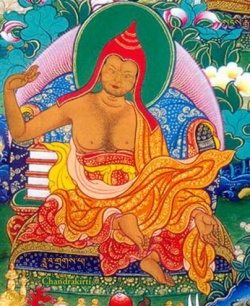Chandrakirti
Chandrakirti (Skt)
月称 (c. 600–650) ( Jpn Gessho)
Chandrakirti - Leading Prasangika Madhyamika master.
(1) A scholar of the Madhyamika school in India. In the early sixth century, Buddhapalita and Bhavaviveka wrote commentaries on Nagarjuna's Verses on the Middle Way (Skt Madhyamaka-karika ).
The differences in their approach and explanation of the truth of nonsubstantiality resulted in the division of the Madhyamika school into the Prasangika school led by Buddhapalita and the Svatantrika school led by Bhavaviveka.
Chandrakirti inherited the doctrine of Buddhapalita and criticized the doctrine of Bhavaviveka, thus completing the doctrine of the Prasangika school. For this reason, he is regarded as the effective founder of the Prasangika school.
He asserted that the truth of nonsubstantiality is beyond the reach of logical demonstration and is attainable only by practice.
The most important of his works is the Prasannapada (The Clear Worded), which is the only extant Sanskrit commentary on Verses on the Middle Way.
Knowledge of the original Sanskrit text of Madhyamaka-karika is available only through the Prasannapada, the translation and study of which have therefore been carried out with great care and interest.
Chandrakirti also wrote commentaries on Nagarjuna's other works and on Aryadeva's Four-Hundred-Verse Treatise.
His original work is Entering the Middle Way (Madhyamakavatara). These works are extant in their Tibetan translations.
(2)月称大臣( Jpn Gassho-daijin): Also known as Chandrayashas. A minister who served Ajatashatru, the king of Magadha in India. He is mentioned in the Nirvana Sutra.
The king was suffering from virulent sores all over his body because of his offense of killing his father, Bimbisara, a patron of Shakyamuni Buddha.
His six ministers appeared in succession before him, each exhorting him to consult a different one of the six non-Buddhist teachers for a remedy. Chandrakirti was the first of these ministers to address the king.
He urged Ajatashatru to see Purana, the non-Buddhist teacher known for his denial that there is a causal relationship between one's deeds and what one experiences as a result. See also six ministers.
Source
Chandrakirti (Skt. Candrakīrti; Tib. ཟླ་བ་གྲགས་པ་, Dawa Drakpa; Wyl. zla ba grags pa) — a renowned Indian scholar who was born in the early seventh century.
He is the author of Introduction to the Middle Way (Tib. དབུ་མ་ལ་འཇུག་པ་, Uma la jukpa), Clear Words (Tib. ཚིག་གསལ་, Tsik sal) and other key works of the Prasangika Madhyamika.
One of the “seventeen great panditas” and considered he greatest exponent of Prasangika Madhyamaka. Wrote Madhyamakavatara, famous commentary on Nagarjuna’s Treatise of the Middle Way.
Writings
His major writings include:
- Clear Words
- Commentary on the Four Hundred Verses on the Yogic Deeds of Bodhisattvas
- Commentary on the Seventy Stanzas on Emptiness
- Commentary on the Sixty Stanzas on Reasoning
- Introduction to the Middle Way
- Seventy Verses on Taking Refuge
Further Reading
- Cesare Rizzi, Candrakīrti (Delhi: Motilal Banarsidass, 1988).
- David Seyfort Ruegg, The Literature of the Madhyamaka School of Philosophy in India (Wiesbaden: Harrassowitz, 1981).
- Kevin A. Vose, Resurrecting Candrakirti—Disputes in the Tibetan Creation of Prasangika (Boston: Wisdom Publications, 2008).
- Lobsang N. Tsonawa, Indian Buddhist Pandits from The Jewel Garland of Buddhist History (Dharamsala: Library of Tibetan Works and Archives, 1985).
External Links
Source
Candrakīrti (600–c. 650), (Devanagari: चन्द्रकीर्ति; Chinese: 月称 Yuèchēng; Japanese: 月称 Gesshō; Tibetan: ཟླ་བ་གྲགས་པ ) was an Indian scholar at Nālandā Mahāvihāra.
He was a disciple of Nāgārjuna and a commentator on his works and those of his main disciple, Āryadeva. He was born into a Brahmin family in Samanta, in South India.
Teachings and works
Candrakīrti was the most famous member of what the Tibetans came to call the dbU-ma thal-'gyur, an approach to the interpretation of Madhyamaka philosophy sometimes back-translated into Sanskrit as Prāsaṅgika Madhyamaka or rendered in English as the "Consequentialist" or "Dialecticist" school.
In his writings Candrakīrti defended Buddhapālita against Bhāvaviveka, criticizing the latter's acceptance of autonomous syllogism.
He also offered refutations of a number of earlier Buddhist views such as the Vijñānavāda or Idealist school.
Candrakīrti's works include the Prasannapadā—Sanskrit for "clear words"—a commentary on Nāgārjuna's Mūlamadhyamakakārikā and the Madhyamakāvatāra (his supplement to Nāgārjuna's text) and its auto-commentary.
The Madhyamakāvatāra is used as the main sourcebook by most of the Tibetan monastic colleges in their studies of 'emptiness' (Sanskrit: śūnyatā) and the philosophy of the Madhyamaka school.
Candrakīrti the latter
The Tibetan translation of Caryāpada provided the name of its compiler as Munidatta, that its Sanskrit commentary is Caryāgītikośavṛtti,
and that its Tibetan 'translator' (Tibetan: Lotsawa) was Candrakīrti. This is a later Candrakīrti, who assisted in Tibetan translation in the Later Transmission of Buddhism to Tibet.
Major works
- Prasannapadā (Clear Words) : A commentary on Nāgārjuna's Mūlamadhyamakakārikā
- Madhyamakāvatāra (Entering the Middle Way or Guide to the Middle Way)
Quote
“If, by trying to understand the truth, you dispel the misunderstandings of some people and thereby some philosophies are damaged — that cannot be taken as criticizing the views of others.”
